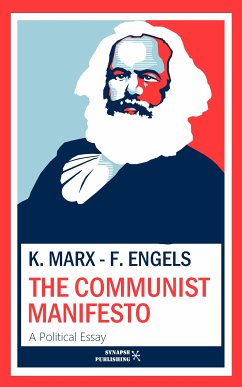
The Communist Manifesto (eBook, ePUB)

PAYBACK Punkte
0 °P sammeln!
The Communist Manifesto, penned by Karl Marx and Friedrich Engels in 1848, is a seminal text that articulates the principles of communism and critiques the socio-political structures of capitalism. Employing a fiery rhetorical style that blends historical analysis with passionate calls to action, the manifesto navigates the stark class antagonisms that define capitalist societies. It underscores the inevitable clash between the bourgeoisie and the proletariat, ultimately advocating for a revolutionary overthrow of the capitalist system. The text, steeped in the context of its tumultuous politi...
The Communist Manifesto, penned by Karl Marx and Friedrich Engels in 1848, is a seminal text that articulates the principles of communism and critiques the socio-political structures of capitalism. Employing a fiery rhetorical style that blends historical analysis with passionate calls to action, the manifesto navigates the stark class antagonisms that define capitalist societies. It underscores the inevitable clash between the bourgeoisie and the proletariat, ultimately advocating for a revolutionary overthrow of the capitalist system. The text, steeped in the context of its tumultuous political environment, served not only as a rallying cry for workers but also as a profound theoretical foundation for subsequent socialist movements worldwide. Karl Marx, a philosopher, economist, and social theorist, was profoundly influenced by the socio-economic conditions of 19th-century Europe, marked by rapid industrialization and stark class disparities. His engagement with Hegelian dialectics and reaction to the alienation experienced by laborers shaped his revolutionary ideology. Collaborating with Engels, Marx sought to inspire a global working-class movement, reflecting his commitment to social justice and equality that transcended national boundaries. The Communist Manifesto remains a crucial read for anyone seeking to understand the historical and ideological underpinnings of modern political thought. Its incisive critique of capitalism and its rallying call for collective action are as relevant today as they were in the 19th century. Readers are invited to explore the transformative ideas that continue to challenge the status quo and inspire future generations.
Dieser Download kann aus rechtlichen Gründen nur mit Rechnungsadresse in A, B, BG, CY, CZ, D, DK, EW, E, FIN, F, GR, H, IRL, I, LT, L, LR, M, NL, PL, P, R, S, SLO, SK ausgeliefert werden.














